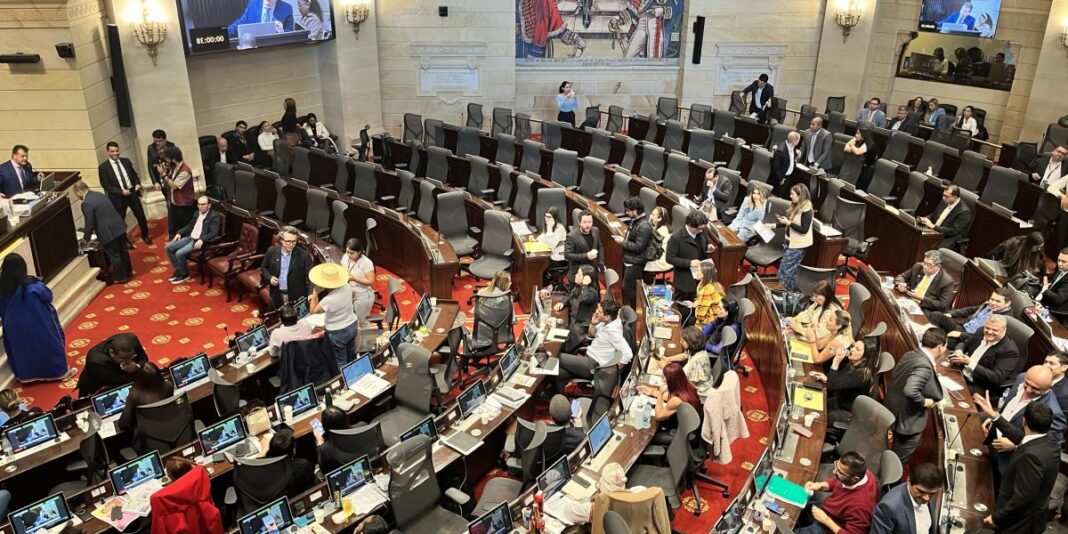Bogotá, Colombia – They gathered, but the room remained still. Voices that were meant to rise, to argue, to craft the future, fell silent again. The labor reform, a bill meant to reshape the lives of countless Colombian workers, has yet to move forward, despite five sessions of waiting. Time stretches thin, like the patience of those outside the chambers, who dream of change but find themselves waiting in the heavy shadow of politics.
On Tuesday, September 24, what should have been a pivotal day for the Colombian labor reform debate turned into yet another session where nothing shifted. The bill was quietly removed from the day’s agenda, and no debate was had. Just a day prior, hope was lifted and dashed again when members of the Conservative, Liberal, and U parties walked out, leaving the hall with no quorum—no ability to make decisions, only the echo of unfinished promises.
The Struggle for Change, The Promise of Tomorrow
Gloria Inés Ramírez, Colombia’s Minister of Labor, has stood steadfast at the heart of this reform, her eyes focused on a future where workers are protected and fairly treated. Alongside her, Iván Daniel Jaramillo, Vice Minister of Employment and Pensions, has urged the chambers to push forward. With calm conviction, they continue to speak of improving the reform, ensuring it benefits “the Colombians, the men and women, who deserve better.” Their voices, filled with the weight of their mission, promise that “the government will work tirelessly until this reform is approved.”
But despite their efforts, the debate hasn’t even begun.
“We have the spirit, the will, and the determination,” Ramírez has said, promising that by December, the labor reform will be law. Yet with each passing session where nothing happens, that December promise seems farther away, like a distant light on the horizon.
Political Dance: Quorum and Controversy
The reform process began officially on August 14 when it reached the Seventh Committee of the Chamber with signatures from seven out of ten of its proposers. But signatures aren’t enough to push legislation forward when politics gets in the way. The opposition—particularly the Centro Democrático, Cambio Radical, and the Conservative Party—has been deliberate in slowing progress. They called for a verification of quorum last Wednesday, knowing the room was full of talk but lacked the numbers to make decisions. And when it became clear that the decisive quorum of 94 representatives wasn’t met, they postponed the discussion.
Labor reform in Colombia faces not just bureaucratic hurdles but fierce debate over the heart of the law itself. Some say it’s too much, too fast. Business groups, holding their breath, fear higher costs for companies. The Council of Guilds speaks of contracts changing, with the elimination of fixed-term agreements and new rules about dismissals without cause. There’s also a worry that pushing nighttime work hours to start at 7 p.m. would weigh heavily on employers. And that’s just the beginning of what’s at stake.
What’s Left Behind, What’s Pushed Forward
When the bill was first discussed in committee, several key articles were already cut. Among them were protections for collective bargaining, including the right to strike in essential public services. The idea of restricting service contracts also fell by the wayside. And the suggestion to increase apprentice quotas for businesses? Struck down before it even had a chance to spark deeper conversation.
Now, what remains of the reform contains six major changes: a focus on indefinite-term contracts, stronger protections with higher compensation for unjust dismissals, new demands on contractors and subcontractors, and stricter disciplinary measures. The workday, too, might shift, with new rules separating day and night work. These elements carry the potential to reshape the very fabric of how Colombian workers live and labor.
The Wait Continues, But So Does Hope
The bill may have been pulled from Tuesday’s agenda, but Ramírez was there, as she has been through every step of this journey. She sat in the chamber, watching as the minutes ticked by, carrying with her the hopes of workers across the country. She knows that change, like the slow turn of the seasons, doesn’t always come when expected. But still, it comes.
This reform may be delayed, the debate deferred, but the conversation is far from over. Each pause in Congress is a step in a dance that will eventually lead to something greater, something that lifts the working people of Colombia into the future Ramírez and Jaramillo dream of. And though politics may seem like a forest full of obstacles, with perseverance, the path can be cleared.
One day, perhaps soon, the voices in that chamber will rise again. They will speak of justice, of equity, of the dignity that comes with fair labor. And when that day comes, the wait will have been worth it.


